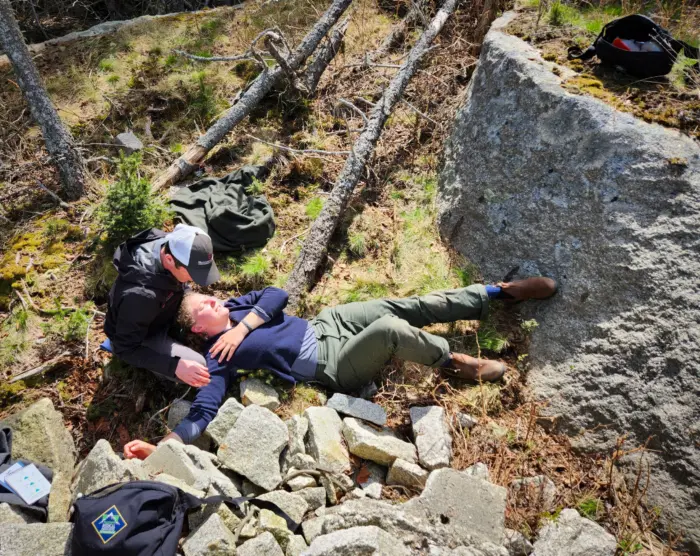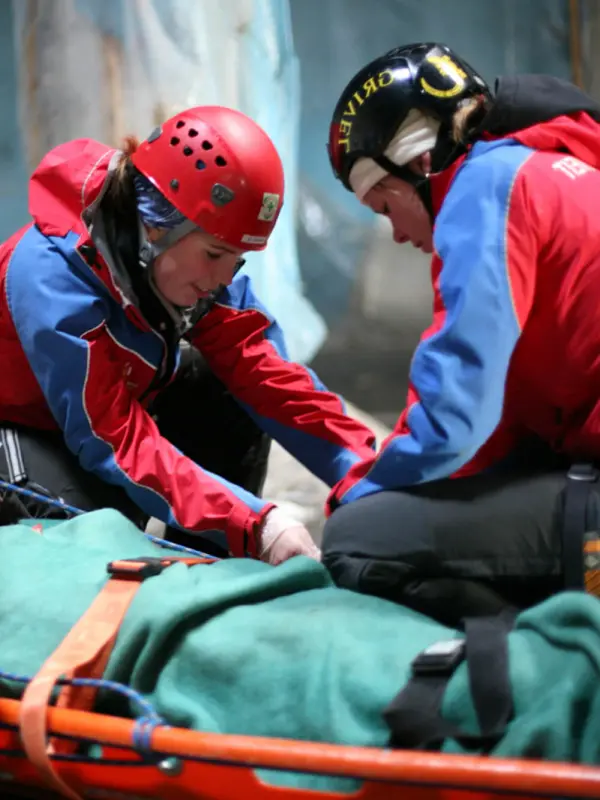5-Day Wilderness First Responder
- Minimum Duration
- 30 hours pre-course / 45 hours in-person
- Minimum Age
- 18
- Minimum Cost
- $600+ USD
- Skill Level
- Any

Description
The Wilderness First Responder (WFR) course provides essential training in wilderness medicine, leadership, and critical thinking for professionals, leaders, and outdoor adventurers in outdoor, low-resource, and remote environments.
Course Format
This course model requires 30+ hours of pre-course work including textbook learning and completion of a study guide and online exam followed by 45+ hours of in-person learning over the course of five days. Students must register four to six weeks prior to the course to ensure adequate time for pre-course work. Internet is required to register, complete pre-course paperwork, and take the online pre-course exam.
Curriculum
The WFR Curriculum involves a minimum of 70 hours of instruction when taught in the United States and 80 hours when taught in Canada. Hours vary in other countries. During the course, students learn the essential principles and skills required to assess and manage medical problems in isolated and extreme environments for days and weeks if necessary.
Requirements
Prior to enrolling, please review our Functional Position Description. The criteria in this policy allow students to self-assess their ability to meet the demands of a WMA International course as well as the demands of a certified wilderness medical provider in the field.
Evaluation
This course is pass/fail. 100% attendance is mandatory. Evaluation is based on practical patient simulations, hands-on activities, and a written test. WMA International is committed to making reasonable accommodation for any student with special needs.
Recertification
Certifications are valid for three years. Graduates of this course may recertify by taking a Wilderness First Responder Recertification course or a Bridge (WAFA to WFR) course.
Skills Taught
- The general principles of wilderness and rescue medicine with an emphasis on identifying medical emergencies, critical thinking, and risk management.
- Patient assessment and emergency care including CPR and AED use, basic life support skills, the patient assessment system, patient reporting, and calling for help.
- Environmental medicine including illness and injuries related to altitude, temperature, lightning, submersion, and environmental toxins.
- Backcountry medicine including the assessment and treatment of common medical problems.
- Treatment of injuries from traumatic mechanisms and the treatment of musculoskeletal problems such as overuse syndromes and dislocations.
- Non-technical lifting, moving, and extrication of patients with an emphasis on spinal motion restriction when applicable.
- Practical Skills including bleeding control, wound management, bandaging, splinting, spine stable patient packaging, hypothermia management, medical kit preparation.
- WMA International wilderness protocols including treatment of anaphylaxis, wound management, CPR in a remote setting, spine injury assessment, reduction of simple dislocations, and treatment for severe asthma.
Skills Taught
- The general principles of wilderness and rescue medicine with an emphasis on identifying medical emergencies, critical thinking, and risk management.
- Patient assessment and emergency care including CPR and AED use, basic life support skills, the patient assessment system, patient reporting, and calling for help.
- Environmental medicine including illness and injuries related to altitude, temperature, lightning, submersion, and environmental toxins.
- Backcountry medicine including the assessment and treatment of common medical problems.
- Treatment of injuries from traumatic mechanisms and the treatment of musculoskeletal problems such as overuse syndromes and dislocations.
- Non-technical lifting, moving, and extrication of patients with an emphasis on spinal motion restriction when applicable.
- Practical Skills including bleeding control, wound management, bandaging, splinting, spine stable patient packaging, hypothermia management, medical kit preparation.
- WMA International wilderness protocols including treatment of anaphylaxis, wound management, CPR in a remote setting, spine injury assessment, reduction of simple dislocations, and treatment for severe asthma.
